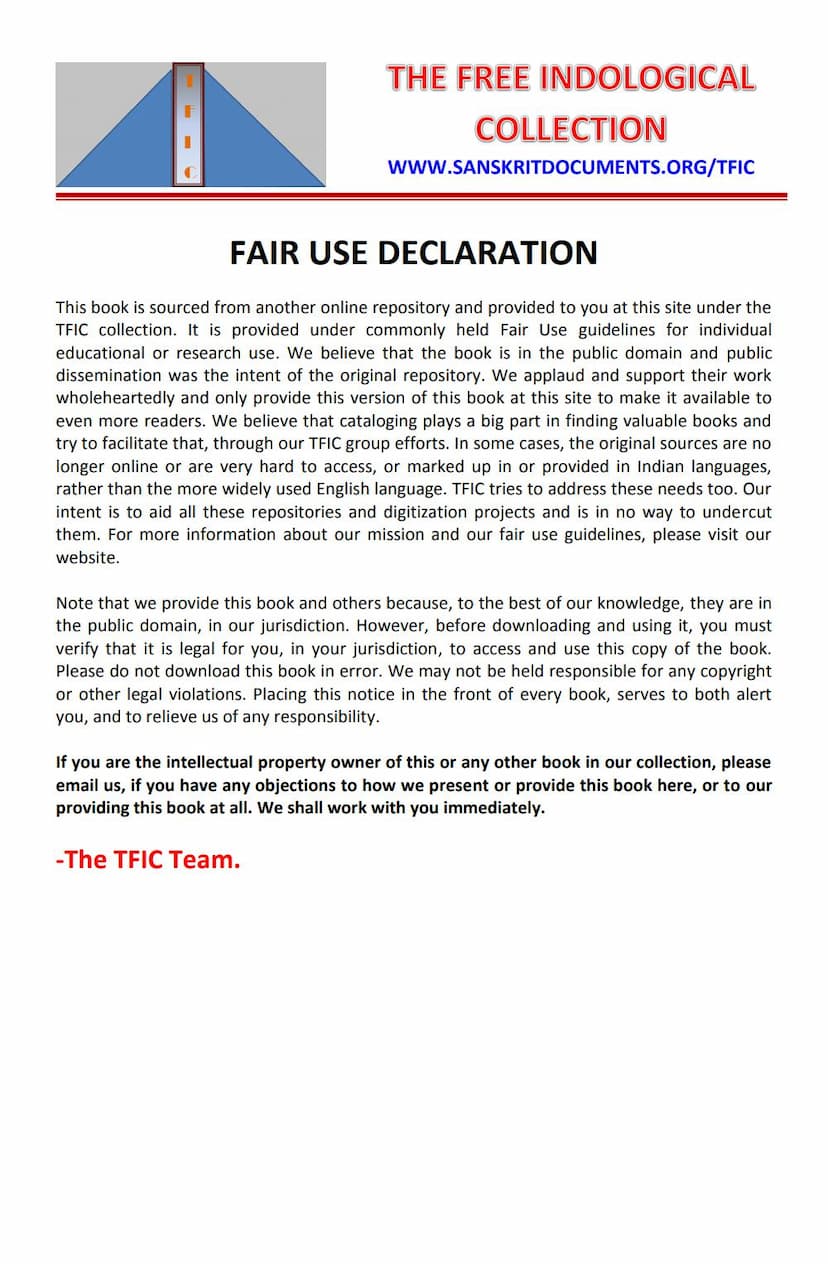Jain Bhajan Tarangani
Added to library: September 1, 2025

Summary
The Jain text "Jain Bhajan Tarangini" by Nyamatsinh Jaini is a collection of devotional songs (bhajans) and poetic verses primarily aimed at spiritual edification and moral guidance within the Jain tradition. The book is organized into several sections, each containing hymns and teachings attributed to or in praise of Lord Mahavir and other Jain Tirthankaras, as well as general spiritual and ethical principles.
Here's a breakdown of the key themes and content covered in the provided pages:
Overall Purpose and Tone: The collection reflects a devotional and didactic intent, seeking to inspire faith, virtuous conduct, and spiritual understanding among Jain followers. The language is primarily Hindi, often employing a devotional, lyrical, and sometimes argumentative style to convey Jain philosophy.
Key Themes and Sections:
-
Stuti-Prarthana (Praise and Prayer): This is the largest section, featuring numerous hymns in praise of Lord Mahavir.
- Praise for Lord Mahavir: The bhajans highlight Mahavir Swami as the propounder of the Jain faith, the dispeller of darkness and ignorance, the source of peace and happiness, and a beacon of compassion and truth. They emphasize his role in eradicating violence, promoting non-violence (Ahimsa), and revealing the path to liberation (Moksha).
- Key Teachings: The hymns often encapsulate core Jain principles, such as:
- Renunciation: The importance of abandoning vices like falsehood, theft, deceit, anger, lust, greed, ego, intoxicants, and adultery.
- Karma: The concept of karma as the cause of suffering and the means to liberation through its destruction.
- Self-Realization: The understanding of the soul as inherently pure and divine, identical with the Supreme Being, achievable by eradicating karmic matter.
- Compassion and Love: The necessity of showing kindness and love towards all beings.
- Syadvada: The Jain doctrine of manifold perspectives, which is presented as a method to overcome ignorance and philosophical disputes.
- Right Faith, Knowledge, and Conduct (Samyak Darshan, Gyan, Charitra): These are presented as the path to spiritual liberation.
- Appeals for Guidance: Many prayers ask for divine intervention to overcome ignorance, greed, ego, and to attain spiritual qualities like compassion, helpfulness, and righteousness.
-
Adhyatma (Spirituality/Self-Realization): This section delves into the nature of the soul and its relationship with the divine.
- Inner Divinity: It emphasizes that God (or the true essence) is not to be found in external places like temples or mosques but within oneself. The soul is described as being intrinsically pure and blissful.
- Oneness of the Soul: The verses suggest that the perceived differences are illusory, and the true self is one with the divine.
-
Upadeshi Bhajan (Didactic/Preaching Bhajans): These bhajans offer moral and ethical advice.
- Social and Moral Responsibility: They address societal issues like the decline of communities, the importance of education, helping the needy, eradicating hatred and selfishness, and promoting peace and truth.
- Personal Conduct: Emphasis is placed on acquiring strength through knowledge, maintaining moral integrity, practicing virtue, and living a life dedicated to the welfare of others.
- Overcoming Obstacles: The bhajans encourage perseverance in the face of adversity and adherence to Dharma.
-
Jeevandhar Natak Sambandhi Bhajan (Bhajans related to the Jeevandhar Play): This section features dialogues and teachings presented in the context of a play about Jeevandhar.
- Political and Ethical Counsel: These verses depict a queen (Vijayasundari) advising a king (Satyaghar) on righteous governance, emphasizing the importance of protecting subjects and the dangers of greed and poor judgment in selecting advisors.
- Critique of Wrong Counsel: The minister's advice, often depicted as misguided or self-serving, is critiqued by contrasting it with virtuous choices and historical examples.
- Importance of Subjects' Welfare: The queen stresses that a king's duty is to his subjects, and personal comfort should be sacrificed for their well-being.
-
Aitihasik Bhajan (Historical Bhajans): These bhajans recount historical incidents and figures, often with a moral or spiritual lesson.
- Gore-Tatti Tilkasundari: A bhajan narrates the story of Tilkasundari, who defends her chastity and virtue against her wicked brother-in-law, highlighting the power of chastity and faith.
- Flood of Yamuna (1922): A poignant bhajan describes the devastation caused by the Yamuna river flood in 1922, depicting the plight of the people and the rescue efforts, serving as a prayer for protection.
- Victory of British Forces (1918): Another bhajan celebrates the British victory over Germany in World War I, praising leaders like King George V and highlighting the contributions of Indian soldiers. This section also touches upon themes of peace and diplomacy.
-
Bhajans for Sons and Daughters (Specific Occasions): Some bhajans are dedicated to specific individuals or events, often for family members.
- For Son Rajkumar: Bhajans for his education, encouraging studiousness and moral conduct.
- For Daughter Kalavati: Bhajans related to festive occasions (Teej), emphasizing traditional customs and the importance of education.
- For Daughter Sitara Devi: Bhajans focusing on the importance of health, hygiene, and education for girls.
- Wedding Bhajans: A bhajan composed for the wedding of Surajbhan Jain, expressing blessings and gratitude.
-
Educational Bhajans:
- The Spinning Wheel (Charkha): A bhajan that explains the parts and process of operating a spinning wheel, designed to educate children about traditional crafts and their importance. It connects the parts of the charkha to characters from the Mahabharata, making it a mnemonic device.
Overall Significance: "Jain Bhajan Tarangini" serves as a repository of devotional poetry that encapsulates the spiritual and ethical teachings of Jainism in a accessible, musical format. It aims to connect individuals to their faith, guide them towards righteous living, and offer solace and inspiration through devotional expression. The collection highlights the enduring relevance of Jain philosophy and its emphasis on compassion, truth, and self-discipline.